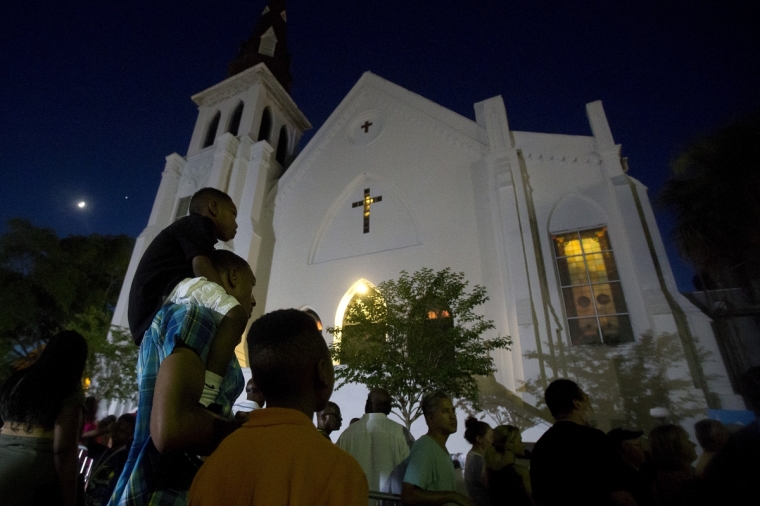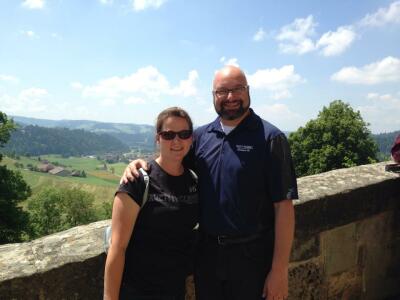Charleston slave cabins, forgiveness at Mother Emanuel stirs Georgia Baptist college president

CHARLESTON, S.C. (Christian Examiner) – Not too far from where today's tribute to those slain in a deadly shooting took place at the Emanual African Methodist Episcopal Church, yesterday a Georgia Baptist college president and his wife were deeply stirred when they heard the Gospel message while on tour at a restored Southern plantation -- in front of slave cabins.
Emir Caner, president of Truett-McConnell College in Cleveland, Georgia, was on an anniversary trip with his wife, Hana, when the two stopped in their tracks to listen.

A Gullah woman from a distinctive group of Black Americans – a descendent of slaves that lives nearby and has retained a unique language and culture – spoke to a crowd gathered at the Boone Halle Plantation about how slaves sang and lived there more than 150 years ago.
"What got slaves through was their belief in Christ," Caner said. "It was remarkable that those who suffered most honored Christ the greatest."
Just eight miles away, Caner said he experienced sobering sights all over Charleston where flags were at half-mast and people were gathered for the first two funerals, in advance of today's memorial services at the Emanuel AME Church.
"It was quiet, just very quiet," Caner said, as he and his wife grew close to pay their respects. "There was reverence and grieving. There were a lot of visitors and people from different religions – a man wearing a sikh."
A group of older men wearing maroon colored shirts bearing a cross logo marched in two lines up and down the street in front of Mother Emanuel church, singing a popular Black gospel song, "We Are Soldiers," also common during the Civil Right's movement.
"It was a martyr's song," Caner said. "'If we must, we will die.' The men sang with deep billowing voices and went right past the church and past us, and back again.
"It was a pretty significant moment," he sighed thoughtfully. "It is the exact opposite of what the media showed in Baltimore and Ferguson."
Reflectively, Caner said he believes the spirit that has pervaded Charleston is one represented by a huge banner displayed by several area ministries on a building next to the church which says: "For the righteous will never be moved; they will be remembered forever, Psalm 112:6. United Faith."
The tone was set, Caner believes, in the first few hours after the horrific massacre when self-confessed shooter Dylann Roof sat quietly through an hour-long Wednesday night Bible study at the church and then began his relentless, hate-filled assault.

"When the church issued its first response of forgiveness for the murderer, that set the stage subsequently for everything that happened after that," Caner said. "When the church and families said, 'We forgive the man that murdered our church pastor, a grandmother and other beloved members.' It was that same spirit that prevailed tonight when we were walking around. It's pretty incredible."
Caner said a Truett student was also impacted by the tragic events and was in town when the shooting happened just days before her wedding. Devin Adams Navarro was married at Citadel Square Baptist Church where her grandmother had attended in 1914.
After saying, "I do," June 20, Navarro and her wedding party took a few minutes to walk next door to pay their respects, leaving their bouquets and boutonnieres at the memorial for the nine killed.
"I wanted to make sure that church knew they were loved and that even though it was the happiest day of my life, I still wanted to show support and respect," Navarro said from her honeymoon in Florida.
Caner, whose own family has a diverse ethnic and religious past, with a Sunni Muslim father from Turkey and a Swedish mother who converted to Islam -- said he and his wife, who grew up in the Czech Republic, are especially sensitive to the outpouring of love and solidarity shown by the Charleston church despite the oppression it has faced.
"People have every right to be angry," Caner said, "but instead their immediate reaction was the same reaction that the Gullah woman re-enacted under slavery, and that was forgiveness."
Throughout Charleston, Caner said there is a great picture he hopes won't be missed.
"The heartbeat of the issue that's missing is the unconditional love of Christ that is being shown by the church and the churches standing together," Caner said.
RELATED ARTICLE: